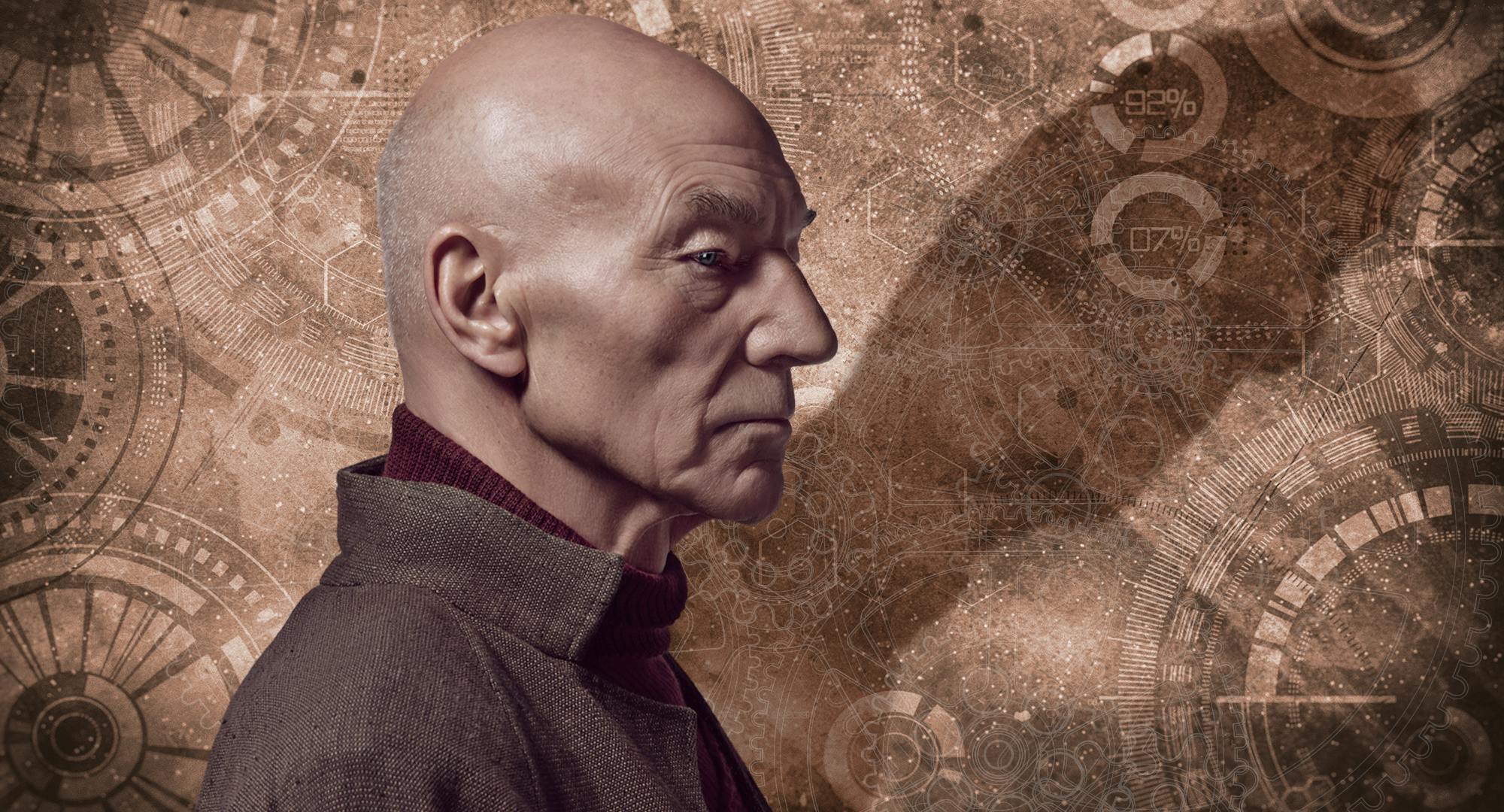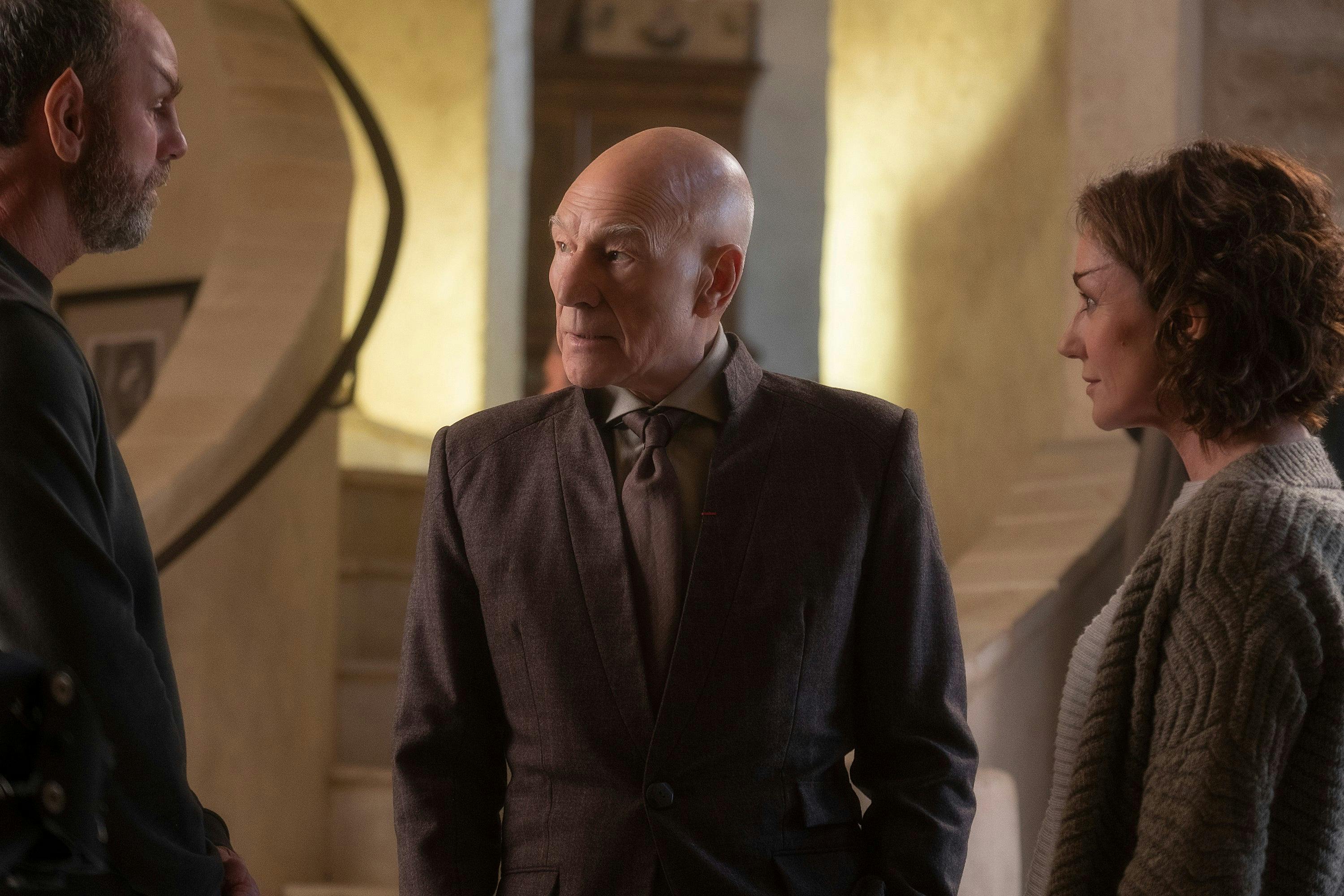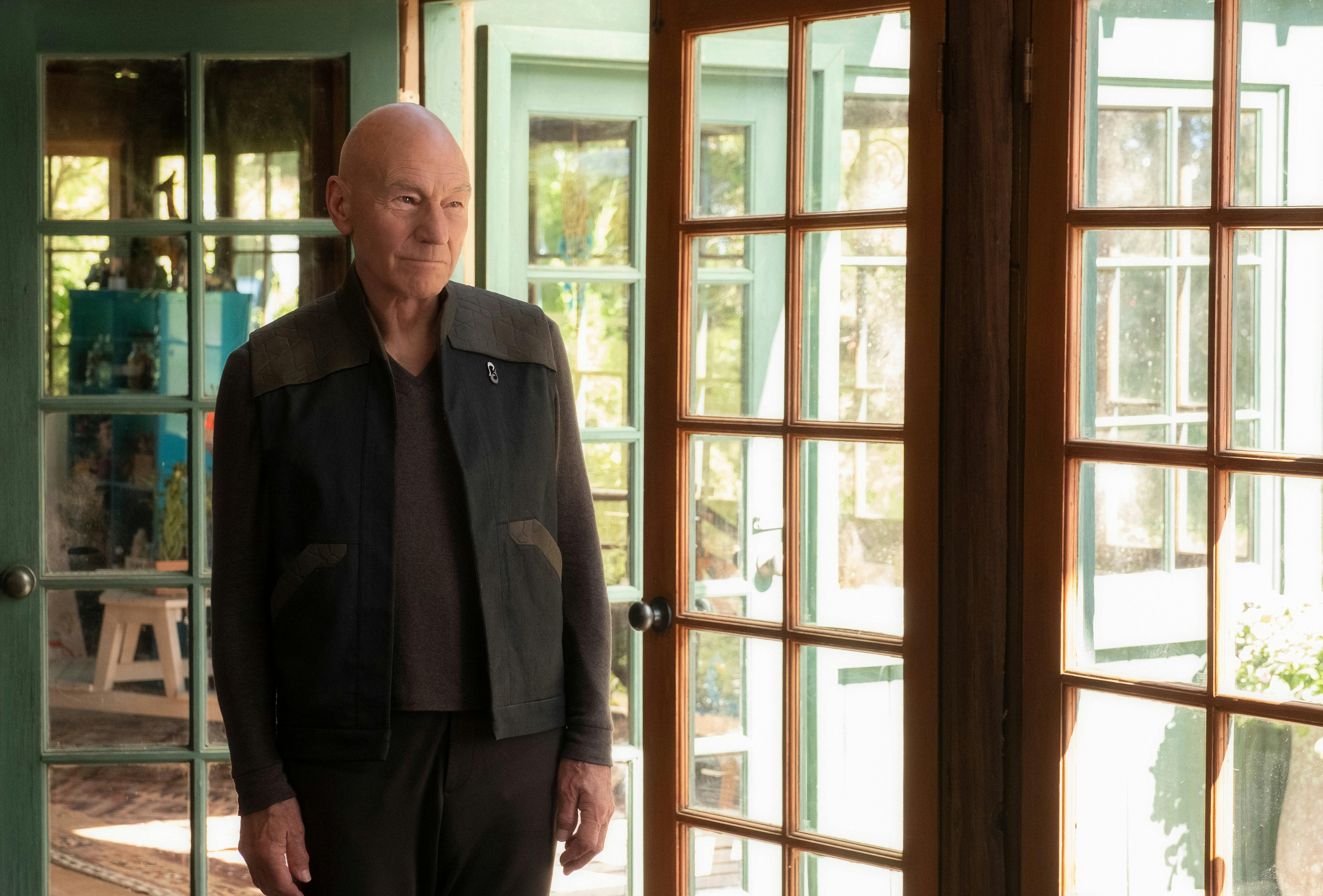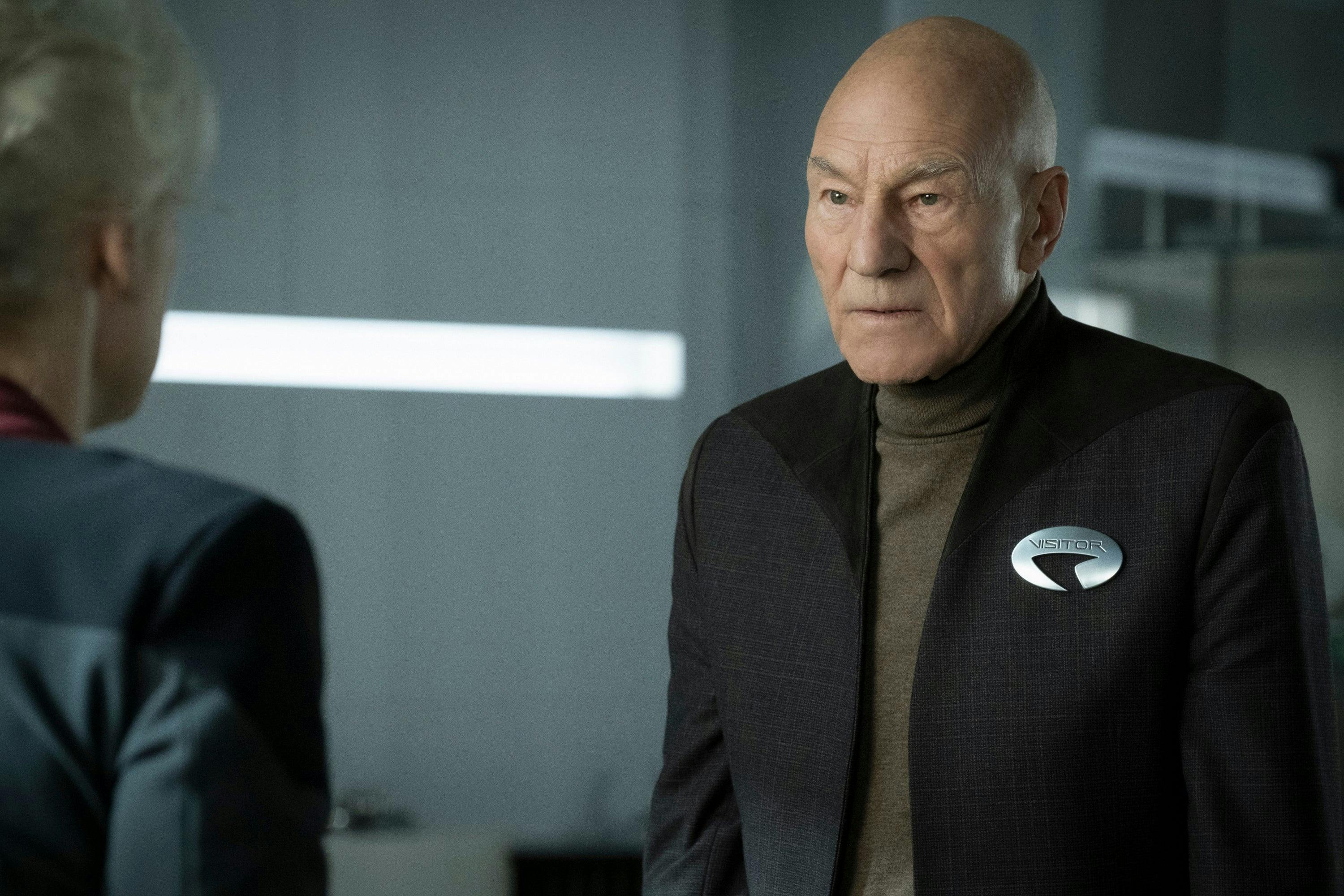Published Mar 26, 2020
Jean-Luc Picard and Men of A Certain Age
Why Picard's story has resonated so strongly

StarTrek.com
“Time is the fire in which we burn,” Captain Picard was warned in Star Trek: Generations. When that movie debuted, I was twelve years old and a relatively newly minted Star Trek fan. I had beamed aboard the Enterprise towards the end of The Next Generation’s seven-year voyage, before devouring the entire back catalogue at my local Blockbuster store. I was gradually adapting to the darker world of Deep Space Nine and eagerly awaiting the debut of Voyager. But nothing could match the sheer awe I felt one night in February 1995, sitting in the Empire Leicester Square and watching open-mouthed as the saucer of the Enterprise-D thundered down onto Veridian III. It felt like a great time to be a Star Trek fan.Twenty-five years later, give or take a few weeks, I found myself back in Leicester Square for the London premiere of Star Trek: Picard. In the intervening quarter century, I’ve certainly felt the flames of time licking away at me. In my late-thirties, I’m approaching the kind of milestone birthday that would make Captain Kirk reach for the Romulan Ale. I’m a whole different person from that twelve-year-old boy — if the scientists are to be believed, the very cells that make up my body have been replaced three times over — and yet, transported back to another glitzy West End cinema, I felt that my younger self was right there with me.Star Trek offers a rare fandom that can be shared by children and adults alike. Many of us fell in love with the Trek universe at a young age and brought that passion with us into our adult lives. As an oral historian of the WW2 era, I was excited to see a show with a nonagenarian protagonist (Picard, of course, is a dozen years older than Patrick Stewart’s sprightly 79 years). But it was sobering to realize that I and the friends I attended the premiere with — all Trekkies since a young age and now saddled with grown-up responsibilities (jobs, mortgages, kids) — are the ones who ought to be out saving the galaxy now. The heroes we grew up with, like our own parents, are retired and approaching their twilight years.

StarTrek.com
For me, the first episode of Picard, "Remembrance," was aptly named, since it sent me shooting back decades into my own memories. As much as I enjoyed the show, the sight of such an elderly, frail Picard was uncomfortable for me. Time has certainly scorched Picard, and for those of us who grew up with the confident, commanding figure of The Next Generation, seeing him so enfeebled, not to mention openly disrespected, was pretty hard. By the time the credits rolled, I felt so emotionally overwhelmed by the experience that I wasn’t sure quite what to make of it.After the premiere I spoke to Akiva Goldsman about the decision to strip Picard of his old power. “That thing that you found disconcerting was the magnet that drew all of us,” he told me. “To come back to Jean-Luc Picard on the bridge of the Enterprise was not interesting to us.” For the writers, Goldsman explained, the real question the show needed to answer was: “Where does that [past experience] lead someone as life starts to approach its end? That’s a story that you don’t typically get to tell in television or movies.”Perhaps it was that sense of approaching an ending – and the prospect of letting go of the character for good – that felt so difficult for me. I first got into Next Generation around the time my own father beamed out of my life, and while growing up in a household of women Picard was probably my most significant male role model. Both he and Patrick Stewart were hugely important to me. For several years in my mid-twenties I pursued a career as a Shakespearean actor, presumably convinced on some level that this was a route to the starship Enterprise. I may not have succeeded in following in either man’s footsteps, but both of them, in different ways, had inspired me. I knew I wasn’t the only man approaching middle age who found himself emotionally compromised by Picard’s return. Max Hegel, a forty-one-year-old fan from Chicago who watched TNG in its first run from "Encounter at Farpoint" onwards, told me that when the new series was announced he was in tears. “It was as if the ground fell away from me and I didn’t know where I was or what was happening,’ he told me. "I tried not to make a big deal out of it because its difficult to say, yes, I am incredibly emotionally attached to a fictional character. That’s sort of a weird thing to talk about openly, and being honest about it was a difficult step for me, but I felt good having done it because I think Picard deserves it."

StarTrek.com
Like me, Max looked to Picard to fill a gap left by his own father. “My dad was around when I was growing up, but I didn’t feel any real connection to him,” he told me. “I didn’t sense any of him in myself or myself in him. But I did kind of see that in Picard. I really identified with Wesley and I wanted Picard to like Wesley because in some way I felt like it was him liking me.”For Max, Picard returning to the small screen – and Patrick Stewart returning to Picard – felt like the kind of validation that his own father had never been able to give him. Another long-time fan, Brandon Shea-Mutala, also had an intense reaction to the announcement of the series. A burly 38-year-old from Saskatchewan, Canada who had been watching TNG from the age of 11, Brandon was there in the room at Star Trek Las Vegas when Alex Kurtzman officially broke the news. His initial excitement – play back footage of the moment and you’ll hear his immediate, NSFW, outburst when Patrick Stewart took the stage – soon gave way to an emotional meltdown. “As he was talking I had tears in my eyes and then afterwards, talking about it with a bunch of equally passionate fans, I just sort of broke down,” he told me. “I was bawling like a baby. I thought, ‘What the hell is wrong with me?’ I’d never had a reaction like this in my life before.”What was it, I wondered, about the return of Jean-Luc Picard that reduced grown men like Brandon, Max and myself to emotional wrecks? Perhaps part of the answer lies in the fire gradually burning away in all of us, and consuming those of an earlier generation altogether. We’re at the age when people start to lose their parents and face their own mortality, and for a generation of young men (and likely women as well) who grew up with Picard as a surrogate father, his return in this very elderly, mortal form is a reminder of the fragility of life. Watching the new series can feel like gazing into the embers of a once-roaring blaze, transfixed by their beauty and yet fully aware of their impermanence. For Michael Chabon, the focus on time running out for Picard was almost as inevitable as death itself. “I think it came naturally with the age of our actor and the age of our character,” he told me. “It would almost have been wrong if that wasn’t to some degree [our focus].” While he was working on the series, Chabon lost his own father, who had introduced him to Star Trek over half a century earlier, at the age of 80. (He later penned a moving tribute in The New Yorker.) “When we had the premiere in Los Angeles, Hannelle Culpepper and I were doing an interview together,” he told me. “She said to the interviewer that her father was coming and that he was a big Star Trek fan and she was so excited to get to show him what we had done. I have to admit I had a little pang at that moment and wished I could have had that same experience.”

StarTrek.com
Ever since the new series was announced, fans have speculated that it will culminate in Picard’s death, barring a last-minute elevation to the Q Continuum or some such magical sci-fi alternative. In “Maps and Legends” we learned that Jean-Luc is suffering from a terminal disease. For me, the most moving moment in the series so far is Deanna Troi’s empathic realization in "Nepenthe" that his days are numbered. For fans who have grown up with the character, Picard’s death may be difficult to cope with. Max Hegel, however, is optimistic. “I accept that these might be our final days with a friend, a family member," he told me, ‘but I think that sometimes those times are very important, especially if they say the things they need to say and do the things they need to do.”I wish I could view the prospect of Picard’s death with that kind of calm acceptance – after all, I’m sure it’s what Jean-Luc would do. But in truth I’m dreading the moment we say goodbye to him for the final time. In an odd way, I think it will feel a bit like losing a parent.In the meantime, I did at least get to fulfill a childhood dream and meet the captain face to face – or rather the next-best thing, Patrick Stewart. The day after the premiere, I attended a press junket at a very classy London hotel. A group of journalists, mostly men and women around my own age who had grown up on Next Generation, were led into a conference room and seated around an beautiful old table, and the stars of the show filed in a few at a time to answer some questions. I’ve done plenty of celebrity interviews in my time, among them many Star Trek cast-members, and never before been starstruck. But as soon as Sir Patrick breezed into the room and took his seat at the head of the conference table, I felt like Reginald Barclay summoned to a meeting of the senior staff. In fact I was so in awe of the man himself, sitting just meters away, that I barely noticed Jeri Ryan was right next to him. (And there aren’t many people who can render her invisible!) Somehow, I plucked up the courage to ask Sir Patrick a question. I told him about the important role Picard had played in my own life, and asked whether the new series would offer an opportunity to inspire another generation of fans. “First of all,” he told me, “I am very touched by your story, and it is one that I have heard many times.” There was that feeling of validation that Max had told me about – an acknowledgment from the man himself of how much his character had meant to me.Sir Patrick went on to tell me about a Las Vegas policeman who had written to him back in the nineties. “He loved his job but he said there are days when I come home and what I have seen and heard and witnessed is so unpleasant, I feel close to despair,” he told me. “And when I feel that way I go to my shelf and take down a tape of Next Generation – and hope returns.” Listening to those rich, comforting tones I could almost imagine I was sitting around the campfire on El-Adrel IV, hearing about the Epic of Gilgamesh.A few minutes later, when our allotted time was up, Sir Patrick and Jeri made a gracious exit. The assembled journalists all took a moment to look at one another. “Well, I don’t know about you guys,” a man about my own age remarked, “but as far as I’m concerned that wasn’t Patrick Stewart at all. We just met Captain Picard.”
SDCC 2019: Sir Patrick Stewart Gets Emotional
Duncan Barrett (@BarrettsBooks) is the co-author of Star Trek: The Human Frontier and the host of ‘Primitive Culture’, a TrekFM podcast about Star Trek and history.
